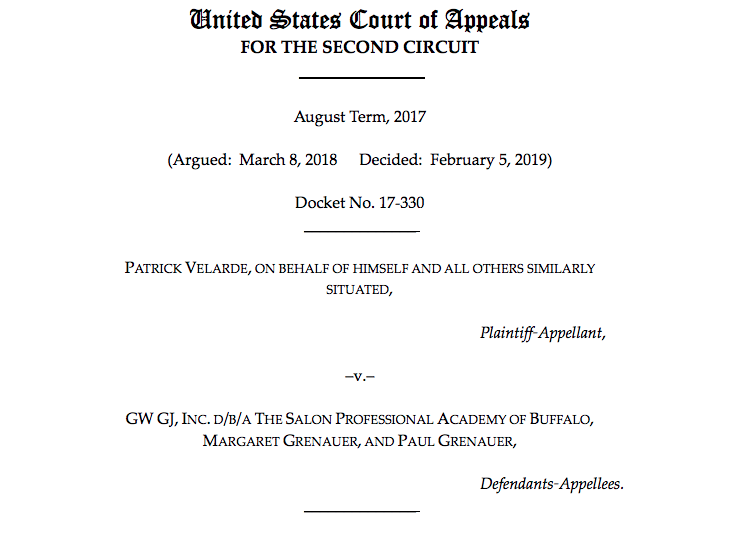- Free Consultation: (631) 352-0050 Tap Here to Call Us
Unpaid Interns? The Saga Continues

Internships offer students the opportunity for hands on supervised learning experiences in their particular field of study. But, must companies pay their interns? This question has been the subject of fierce litigation for several years and a matter considered by New York’s federal appellate court. On February 5, 2019, the Second Circuit Court of Appeals considered yet another case concerning unpaid interns. Today’s Long Island employment law blog discusses the case, Velarde v. GW GJ, Inc.
Generally, federal and state labor laws, such as the Fair Labor Standards Act or FLSA, and the New York State Labor Law or NYLL, require that all employees receive, at least, the minimum wage for the hours they perform work for their employer. So, if interns are considered employees, then companies must pay their interns. But, are interns employees entitled to minimum wage or other pay?
In 2015, the Second Circuit faced, for the first time, the question of whether a company must pay temporary interns. The case, known as Glatt v. Fox Searchlight Pictures, set forth a primary beneficiary test. In its simplest form, the test seeks to determine who is the primary beneficiary of the internship. For instance, if the internship genuinely provides the intern with a learning experience or other opportunity which benefits the intern more than the company, then the intern is not owed wages. If, on the other hand, the company receives the primary benefit, then the intern is considered an employee and must receive wages.
For example, if a law student works for a law firm and accompanies the firm’s lawyers to court to observe proceedings, to depositions to observe how to examine witnesses, or sits in on client meetings to learn interview techniques, then the intern is receiving the primary benefit, since this arrangement truly resembles a learning experience. But, if the law student is assigned responsibilities such as filing, opening mail, and answering the phone, then the internship more closely resembles a paralegal or assistant position, which primarily benefits the law firm, since it provides little, if any, opportunity for the student to learn. In this latter example, the law firm would be liable for wages to the intern.
In Velarde, the plaintiff was a student at a for-profit cosmetology training school. The school provided, as a benefit to its students, the opportunity for hands on experience practicing on members of the public, who paid the school for the services they received. The plaintiff took this opportunity and provide cosmetology services to the public, under the supervision of the school. The plaintiff worked many hours per week, but was not paid, so he sued the school.
In looking at this relationship, the Second Circuit determined that the plaintiff intern was the primary beneficiary of the internship. The Court relied on several facts to draw this conclusion, including that the plaintiff gained significant benefits by working for the school such as he able to complete a minimum number of hours of practical work, necessary to sit for a licensing exam. Moreover, the supervision he received prepared him for the licensing exam.
The Court was unpersuaded by the plaintiff’s argument that he should be considered an employee because the school profited from his internship.
Questions about whether an intern should or should not be paid must be resolved on a case by case basis. The analysis hinges on highly fact specific questions. Those using interns in their workplace should consult with an experienced employment lawyer to determine whether pay is appropriate or not.
Interns not receiving pay should similar consult with an experienced wage attorney to discuss whether the minimum wage and/or overtime laws have been violated.
The Long Island employment employers at Famighetti & Weinick PLLC are experienced in handling unpaid wage and overtime matters. If you have questions about your internship, pay, minimum wage, or overtime, contact one our Long Island employment attorneys at 631-352-0050 or visit our website at http://linycemploymentlaw.com.
Unpaid intern lawsuit









